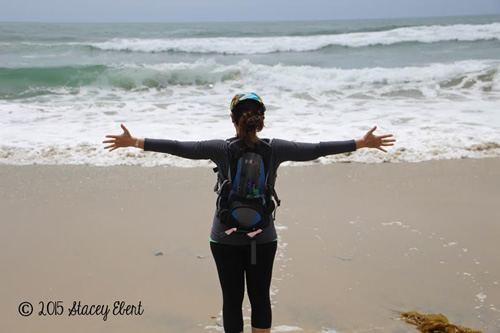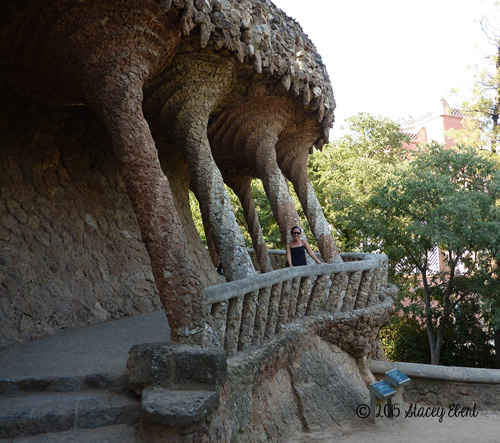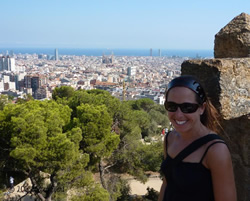Backpacking Abroad After College: Five Lifelong Benefits
Article and photos by Stacey Ebert
Published 8/4/2015
 |
| Backpacking after college is a rite of passage leading to many lifelong benefits. |
As summer approaches, you hear all about it. American universities have finished for the year, and hundreds, maybe even thousands, of graduating seniors ink their passports for the first time. Since its inception, this age-old pastime has often been seen as a luxury of youth. Today, more and more people of all ages are searching for longer-term travel options to expand upon and transform everyday life experiences. After graduating from university, I went backpacking to Europe with two friends. I had no idea how deeply the experience would change our perspectives. Almost 20 years to date, we returned, liberated, broader-minded, and exhausted. Never could I have imagined that I would continue the long-term travels and recall moments from that maiden journey so vividly and often.
Then, it was about the places we visited, the stamps we received, and the food we ate. Today, the experience was about a good deal more. The White House has put a huge emphasis on international experience. It is on a quest to encourage far more students to head abroad for a variety of interests, both for individuals and for a need for international relations of all types, from educational to business. Now more than ever, international exposure counts on job applications and is a big bonus on a resume. Organizations relish hiring those with knowledge and passion for the world beyond their borders. I heard many remarks from others when we were heading out on our journey. Comments often included “escaping real life,” “running away from responsibility,” “when are you getting a job,” and others of a negative nature. Rarely were the words largely positive or encouraging. Today, I realize more and more that what I gained from that trip far outweighs what those naysayers thought I’d be losing.
1. Independence: We had our return tickets booked, a Eurail pass in hand, a general itinerary, our Let’s Go Europe book, and each other. In the years before the internet’s explosion, travel was a bit different. Three Long Island girls on a backpacking journey had no idea what was before them. We not only survived, we thrived! We managed to book places to stay, find safe transport to our next destination, and communicate with each other and locals in languages other than our own. We coordinated schedules, likes, dietary choices, and even keys and learned many other travel skills at a time when all we had to guide us was a paper map and the North Star. I came home changed, having found even more independence than at university. We flourished during those three weeks abroad.
2. Communication skills: Three women traveling together requires a bit of coordination. Not only is it the simple act of sharing a bathroom, but three sets of likes and dislikes, three ideas about what the journey would look like, and three personal histories coexisting in harmony for a while. We continued to not only learn about each other. Still, we communicated our needs and desires to locals in six countries and six languages using six currencies. Relying often on the kindness of strangers, we embraced the unknown, recognized the need to sometimes ask others for help, and honed our communication skills in a world where we learned daily.
3. Perspective: We traveled throughout Western Europe, and our respective perspectives broadened. Between a visit to Anne Frank’s house in Amsterdam, standing amidst the ancient ruins of the Acropolis, and being in the shadows of Rome’s Colosseum, educational experiences occurred at every location and on every path. History revealed itself to us in various enlightening forms, and many we met along the way shared in our journey. We met people from all backgrounds, countries, and walks of life who shared our desire to experience new cultures. Our way wasn’t the only way. We played with street kids at local playgrounds in Greece, stood beside hundreds of travelers/tourists at the changing of the guard, and hurried past the watchful eyes of the Mona Lisa at the Louvre. Abroad, we studied things that couldn’t be taught from a book or absorbed from a digital screen — here, we learned in person. Here, we grew.
 |
| Parc Guell in Barcelona. |
4. International exposure: We were three graduates out for an adventure. In hindsight, I realized that was my first international journey without family or a tour. Today, I see how so many of life’s connections were fused in those three weeks abroad. A taste of new cuisines, different sides of the street on which to walk, various ways to greet people, acceptable hand gestures, and heaps of unusual vocabulary — all were recognized and absorbed continually by us out of necessity. Tolerance, acceptance, navigating the unknown, flexibility, trusting strangers, and acting gracefully were some of the many skills we developed daily. Who knew then just how significant those qualities would become later in life? That initial independent exposure shaped me into the traveler I am today.
5. Love of travel: We stayed in hostels, pensiones, train cars, ferries, and hotels. We chatted with locals, got lost, followed maps, went where the wind took us, ate new foods, made new friends, and pursued adventures. We were alone for three weeks, with a limited itinerary, away from the comfort of university friends or family. We made it from point A to point B, and I found a love of travel along the way. Joy in the everyday, magic in the simplicity, delight in the newness, comfort in the unknown, and pleasure in the freedom to just be — travel changed me, and I am better for it.
It’s been almost two decades since that backpacking extravaganza. I’ve since been to more than eight countries, married a foreigner, lived abroad, and been on longer-term travels (still with a trusty backpack). I’ve used photos from that journey in my ninth grade Global History classroom, and still tell tales of the day we visited the cheese-producing town of Edam. I’ve retraced some of those initial footsteps mentally and physically and remember fondly the newness of it all. More importantly, my comments are entirely positive when I encounter recent graduates setting off on that same adventure today. “Embrace the experience,” “learn from it all,” “keep a copy of your passport on you at all times,” and “enjoy the journey” are words I utter to those fledgling travelers off on the adventure of a lifetime. I know first-hand the benefits of the skills, knowledge, and exposure they will experience and enjoy. I also know how much of that journey they will continue to use far beyond the trip’s end.
 |
Stacey Ebert is a traveler at heart who met her Australian-born husband while on a trip to New Zealand. Stacey was an extracurricular advisor and taught history in a Long Island public high school for over fifteen years, enjoying formal and informal educational practices. After a one-year 'round the world honeymoon and significant long-term travel, travel and its many gifts changed her perspective. She has since left the educational world to focus on writing and travel. She is energetic and enthusiastic about long-term travel, finding what makes you happy, and making the leap. She is an event planner, yogi, and dark chocolate lover in her spare time, spending as much time as possible with her toes in the sand. Check out her website at thegiftoftravel.wordpress.com for more of her travel musings. |
|
